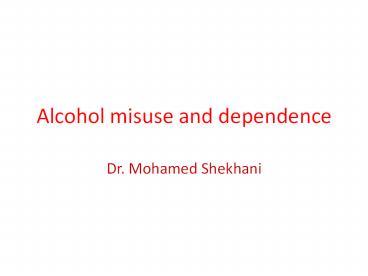Alcohol misuse and dependence - PowerPoint PPT Presentation
1 / 21
Title:
Alcohol misuse and dependence
Description:
Alcohol misuse and dependence Dr. Mohamed Shekhani Introduction: Alcohol consumption associated with social, psychological& physical problems constitutes harmful use. – PowerPoint PPT presentation
Number of Views:213
Avg rating:3.0/5.0
Title: Alcohol misuse and dependence
1
Alcohol misuse and dependence
- Dr. Mohamed Shekhani
2
Introduction
- Alcohol consumption associated with social,
psychological physical problems constitutes
harmful use. - Approximately one-quarter of male patients in
general hospital medical wards in the UK have a
current or previous alcohol problem.
3
Aetiology
- Availability of alcohol
- social patterns of use appear to be the most
important factors. - Genetic factors may play some part in
predisposition to dependence. - The majority of alcoholics do not have an
associated psy-chiatric illness, but a few drink
heavily in an attempt to relieve anxiety or
depression
4
Diagnosis
- Alcohol misuse may emerge during the
patients history, although patients may
minimise their intake. - It may also present via its effects on one or
more aspects of the patients life. - Alcohol dependence commonly presents with
withdrawal in those admitted to hospital, as
they can no longer maintain their high
alcohol intake.
5
Diagnosis
6
Complications of chronic alcohol misuse
- Social problems
- Absence from work
- Unemployment
- Marital tensions
- Child abuse
- Financial difficulties
- Problems with the law, such as violence traffic
offences.
7
Complications of chronic alcohol misuse
- Psychological problems
- 1.Depression is common Alcohol has a direct
depressant effect heavy drinking creates
numerous social problems. Attempted completed
suicide are often associated with alcohol misuse. - 2. Anxiety is relieved by alcohol. People
socially anxious may use alcohol develop
dependence alcohol withdrawal incr anxiety. - 3. Alcoholic hallucinosis is a rare condition in
which alcoholic individuals experience auditory
hallucination in clear consciousness. - Alcohol withdrawal Symptoms usually become
maximal about 2 days after the last drink and can
include seizures (rum fits). - 4.Delirium tremens delirium associated with
severe alcohol withdrawal. With significant
mortality and morbidity
8
Brain effects
- 1.The familiar features of drunkenness are
ataxia, slurred speech, emotional incontinence,
aggression. - 2. alcoholic blackouts Very heavy drinkers
may experience periods of amnesia for events
during bouts of intoxication. - 3.Alcoholic dementia from Established
alcoholism with global cognitive impairment
resembling Alzheimers disease, but which does
not progressmay even improve on abstinent. - 4.Indirect effects on behaviour can result from
head injury, hypoglycaemia encephalopathy.
9
Brain effects
- 5.WernickeKorsakoff syndrome, A rare but
important effect of chronic alcohol misuse an
organic brain disorder results from damage to the
mamillary bodies, dorsomedial nuclei of the
thalamusadjacent areas of periventricular grey
matter. It is caused by a deficiency of thiamin
(vitamin B1), which is most commonly caused by
long-standing heavy drinking an inadequate
diet. - Without prompt treatment, the acute presentation
of Wernickes encephalopathy (nystagmus,
ophthalmoplegia, ataxia, confusion) can progress
to the irreversible deficits of Korsakoffs
syndrome (severe short-term memory deficits
confabulation). - In those who die in the acute stage, microscopic
examination of the brain shows hyperaemia,
petechial haemorrhagesastrocytic proliferation
10
Other effects
- These are protean virtually any organ
can be involved alcohol has replaced syphilis
as the great neurological mimic.
11
(No Transcript)
12
(No Transcript)
13
Management advice
- Clear information from a doctor about the harmful
effects of alcohol safe levels of consumption
is often all that is needed. - In more serious cases, patients may have to be
advised to alter leisure activities or change
jobs if these are contributing to the problem.
14
ManagementPsychological
- Psychological treatment is used for patients who
have recurrent relapses usually available at
specialised centres. - Support is also provided by voluntary
organisations, such as Alcoholics Anonymous (AA)
in the UK. - If alcohol dependence is suspected, withdrawal
syndromes can be prevented, or treated once
established, with benzodiazepines. - Large doses may be required (e.g. diazepam 20
mg 6-hourly), tailed off over a period of 57
days as symptoms subside.
15
ManagementWKC
- Prevention of the WernickeKorsakoff complex
requires the immediate use of high doses of
thiamin( parenteral Pabrinex) - There is no treatment for Korsakoffs syndrome
once it has arisen. - The risk of side-effects, such as
respiratory depression with benzodiazepines
anaphylaxis with Pabrinex, is small when weighed
against the risks of no treatment.
16
Managementdrugs
- Disulfiram (200400 mg daily) can be given as a
deterrent to patients who have difficulty
resisting the impulse to drink after becoming
abstinent. It blocks the metabolism of alcohol,
causing acetaldehyde to accumulat when
alcohol is consumed, an unpleasant reaction
follows with headache, flushing and nausea. - Disulfiram is always adjunct to other, esp
supportive psychotherapy - Acamprosate (666 mg 8-hourly) has recently been
introduced to maintain abstinence by reducing the
craving for alcohol. - Only rarely are antidepressants required
depressive symptoms, if present, usually
resolve with abstinence. - Antipsychotics (e.g. chlorpromazine 100 mg
8-hourly) are required for alcoholic
hallucinosis.
17
prognosis
- Many but not all who become dependent on alcohol
relapse after treatment. - Chronic alcohol misuse greatly increases the risk
of death from accidents, disease suicide.
18
Single choice Qs
- 1. Psychiatric complications of chronic alcohol
abuse include all except - A.Depresion.
- B.Anxiety.
- C.Bipolar disease.
- D.Hallucinations.
- E. Delirium.
19
Single choice Qs
- 2. Now the great neurological mimic is
- A. Syphilis.
- B.Alcoholism.
- C. MS.
- D. B12 deficiency.
- E.TB.
20
Single choice Qs
- 3. Regarding chronic alcoholism brain effects,
all are reversible by abstinence except - A. Korsakof syndrome.
- B.Acute Korsakof encephalopathy.
- C. Alcohol dementia.
- D. Cerebellar ataxia.
- E. Alcoholic blackouts.
21
Single choice Qs
- 14. The following help alcoholics by reducing
craving to alcohol - A.Disulpharam.
- B. Accomprosate.
- C. Vitamin B1.
- D. Benzodiazepines.
- E.Antibiotics.































